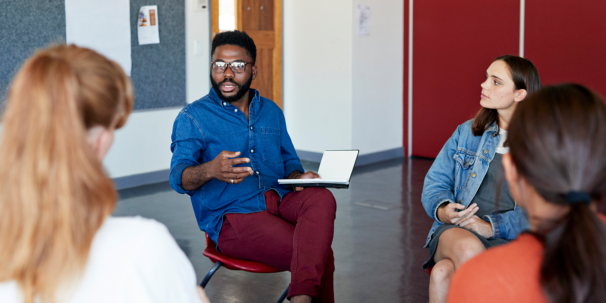Psychological first aid: How to provide mental health support
Explore mental health first aid and learn how it can be used to help those in immediate need of psychological support.

There are all kinds of reasons why someone might need psychological support. Nobody is immune to poor mental health, and at some point in your life, you will undoubtedly need to offer support to a friend or reach out for help yourself.
Psychological first aid can be an excellent tool to combat mental health struggles caused by a variety of reasons. In this article, we’ll explore the importance of mental health first aid, what it can be used for, who can become a first aider, where to receive training, and how to offer support to yourself and others. We’ll also discuss the importance of seeing a mental health professional in certain circumstances.
What is psychological first aid?
So what exactly is psychological first aid? In our open step, experts from the University of Glasgow describe psychological first aid (PFA) as something that can be used to support people who have experienced disasters or other crises. It provides a framework that can be used to offer support in a dignified and respectful way and has been recommended for use by the World Health Organisation.
To expand on this, in our Psychological first aid in organisations open step, Dr Stubley suggests that PFA is humane, supportive and practical assistance for people who are distressed. PFA should consider a person’s culture, abilities, and basic needs, including sleep, food and human interaction.
To break PFA down into simple terms, we can think about what it is and what it isn’t. Experts from the University of Glasgow state:
PFA involves:
- Providing practical and unintrusive care and support
- Assessing needs and concerns
- Helping people to address basic needs, for example, food and water, information
- Listening to people, but not pressuring them to talk
- Comforting people and helping them to feel calm
- Helping people connect to information, services and social supports
- Protecting people from further harm
PFA is not:
- Something that only professionals can do
- Professional counselling
- ‘Psychological debriefing’ in that PFA does not necessarily involve a detailed discussion of the event that caused the distress
- Asking someone to analyse what happened to them or to put time and events in order
- Although PFA involves being available to listen to people’s stories, it is not about pressuring people to share their feelings and reactions to an event




Why is mental health first aid important?
Mental health first aid can be a crucial tool to ensure that people are able to cope with difficult experiences and build resilience, as explored in our Resilience and coping open step and MSc Emergency Management and Resilience degree. Resilience is the ability to bounce back after experiencing hardships, and PFA can help people to grow and develop despite having faced difficulties.
PFA improves resilience by offering continual support, improving self-belief and value, increasing perceived capacity to deal with a difficult situation, and improving willingness to accept support and assistance from others. However, how resilient people are will depend on the nature and severity of the adverse event they experienced.
Although mental health first aid can build resilience, and with that, a person’s ability to cope with difficult situations. However, it’s important to note that PFA cannot get rid of distress, risk or any mental disorders. It’s not a solution to everything, and it should never be promised as such.
Who can claim to be a mental health first aider?
There are no real pre-requisites to being a mental health first aider. Similarly to ordinary first aid training, anyone can learn PFA and use it to support people in need. Learning PFA, however, is not the same as being a qualified mental health professional.
It will help to be an empathetic person with good listening skills before you get started, but a PFA course will teach you everything you need to know to start offering support. You might also receive some kind of certificate to show you are a mental health first aider. On a well-respected course, you’ll learn:
- How to spot the signs and triggers of mental health problems
- How to reassure and comfort someone in distress
- The factors that can impact mental health and wellbeing
- How to listen non-judgementally
- How to guide someone towards further support where appropriate, including resources or a mental health professional
What can psychological first aid be used for?
While PFA can be used to offer support to anyone who has experienced distress, there are certain circumstances that can arise where it can be particularly useful.
Some examples include:
- Natural disasters
- War or conflict
- Terrorist attacks
- Pandemics (such as COVID-19)
- Escaping a country as a refugee
In some of these situations, people will have experienced a lot of trauma, and they will need professional help from doctors and psychiatrists. However, for people without complex mental health problems, PFA can provide tools for them to cope with things they might be struggling with. This might be losing personal belongings, having to move to a new country, leaving family members, or witnessing violence.
Even if someone also requires professional mental health support, PFA can be helpful to have alongside therapy. Sometimes it can take a while to access professional mental health services, and in the meantime, people who have faced trauma might need some support and coping strategies.
Where to get mental health first aid training
If you’re interested in getting psychological first aid training, we have some excellent courses available to do just that. Created by Public Health England, our PFA courses offer a certificate upon completion to show that you’re a certified mental health first aider.
Our COVID-19: Psychological First Aid course is a 3-week course where you’ll explore the psychological impact of the COVID-19 pandemic and what you can do to help people cope. The course is based on international guidance from the World Health Organisation and United Nations. You’ll learn about common responses to the pandemic and learn how to offer emotional support.
We also have a similar course created by Public Health England in collaboration with The London School of Hygiene & Tropical Medicine, COVID-19: Psychological First Aid in Africa. This course also explores PFA for those affected by the coronavirus pandemic but focuses on the African continent, and is specifically adapted for first responders in Africa.
You’ll pinpoint ways to care for yourself and other first responders, learn how to deal with emergencies, and learn to provide psychosocial support during crises.
Our third PFA course is aimed specifically at children and young people and focuses on what you can do to help them cope and access the support they need during and after emergencies and crisis situations. You can join our Psychological First Aid: Supporting Children and Young People course today.
Other mental health courses
If you’re interested in learning more, we do have plenty of other courses that can supplement your knowledge of mental health. You can learn about Workplace Wellbeing: How to Build Confidence and Manage Stress if you want to focus on the workplace, or Understanding Suicide and Suicide Prevention Strategies in a Global Context if you want to offer vital mental health support.
Looking to earn a mental health degree? You can join our MSc Mental Health master’s degree if you already have a bachelors degree in any subject. This will suit you if you’re looking to better understand mental health and its impact on individuals and communities in a professional or personal capacity. We also have a wide range of other master’s degrees for you to explore if you’re curious about other topics you can earn an online degree in.






How to practise mental health first aid for yourself and others
While you’ll be able to learn a lot more about practising PFA in a certified course, we have some information and tips so you can get an idea about what it involves.
For yourself
If you’re providing mental health support to others, you need to ensure that you’re looking after yourself. You can learn all about mental health in our blog for World Mental Health Day, and we also have some useful information about how to cope with Seasonal Affective Disorder and Anxiety.
We also have some key tips on how to look after yourself in our blog on self-care strategies. For more details, you can take a look at the article, but below we’ve provided our top self-care tips:
- Eat healthily
- Get some fresh air
- Exercise or move your body
- Practice mindfulness
- Express gratitude
- Limit your screen time
- Stay in touch with friends and family
- Get a good night’s sleep
- Journal your thoughts
- Limit your alcohol intake
- Be kind to yourself
- Enjoy some alone time
For others
The first thing you need to do before you can offer PFA to someone is assess their support needs. We go into more detail about this in our open step, but we’ll discuss this briefly now.
When you first meet someone in need of PFA, it’s important to get some background information before approaching them. What have they just experienced, and how could that be affecting them? Also, how will this affect the way you communicate with them and their response?
Once you know a bit more about their current circumstances, you can approach them and try to identify their immediate needs. Start off with the basics. Are they cold, thirsty, hungry, or sick? It’s vital that they first have access to anything they need before you can offer further assistance.
Next, you’ll need to assess their support needs. This can include practical things such as daily care, medication, financial assistance or support caring for others. Alternatively, it can involve more psychological care, such as having someone to talk to or finding meaningful activities. Once you know what they need, you’ll be able to help them or refer them to someone who can.
When someone should see a mental health professional
It’s really important to know when to see a mental health professional. Whether you visit your GP, a trained psychiatrist, or a counsellor, it’s crucial to reach out and get help when needed. As a psychological first aider, it’s also important to know when you’ve done all you can and be able to refer someone to professional help.
Some signs that you should reach out or refer someone to a mental health professional are:
- You feel unhappy or sad most of the time
- You feel nervous or anxious most of the time
- You think about harming yourself or others
- You’re unable to engage in healthy habits such as sleeping and eating
- You’re struggling to cope at work, school, or in relationships
- You’re suffering from an addiction or substance abuse
- You’re struggling to deal with a loss (of a loved one, a relationship, or even a job)
- You’re unable to cope with abuse you’ve suffered previously
- You’re worried about your sexual orientation or gender identity
- You’re struggling to cope with someone else’s mental health issues
Final thoughts
Hopefully, this has been a useful guide to psychological first aid and how to become a certified mental health first aider. If you’re interested in helping people who have experienced distressing situations, PFA could be something worth learning more about.
It can even be worth having someone trained in PFA at your workplace, school, or university, to make sure that everyone has an experienced first aider they can go to when they’re struggling with their mental health.








